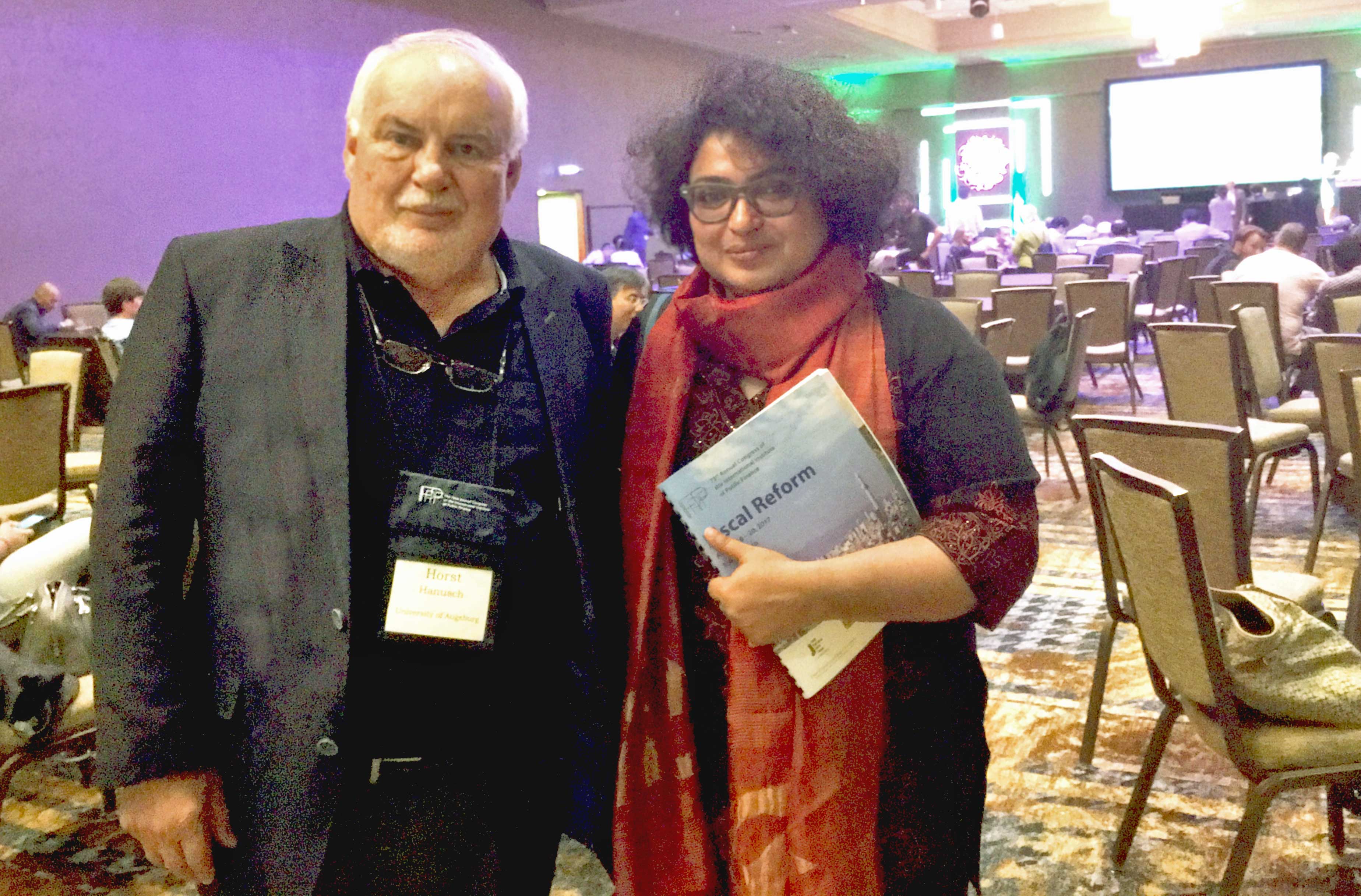NIPFP faculty members were part of the three-day 72nd Annual Congress of International Institute of Public Finance, on "Entrepreneurship, Innovation and Public Policy", held at Lake Tahoe, Nevada on August 9-11, 2016.

Dr. Lekha Chakraborty, NIPFP with co-author, Prof. Horst Hanusch (ex-President of IIPF)
In the session on "Fiscal Policies and Economic Growth", Dr. Lekha Chakraborty presented a paper co-authored with Prof. Horst Hanusch (ex-President of International Institute of Public Finance and University of Augsburg, Germany) and Swati Khurana (Intern, NIPFP) titled "Public Expenditures, Innovation and Economic Growth: Empirical Evidence from G20 Countries". The paper analyses the effectiveness of public expenditure on economic growth within the analytical framework of Comprehensive Neo-Schumpeterian Economics” (CNSE). Using Fixed Effects model for G20 countries, the paper investigates the links between the specific categories of public expenditures and economic growth, captured in human capital formation, security state, infrastructural development and innovation orientation. The results revealed that the impact of innovation-related spending on economic growth is much higher than the other macrovariables. The data for the study was organized from the electronic data base of Government Finance Statistics (IMF), the Infrastructure Reports for the G20 countries and the World Development Indicators (World Bank).
Dr. Sudhanshu Kumar presented a paper on "Minimising Selection Failure and Measuring Tax Gap: An Empirical Model" in the session titled "Shadow Economies" chaired by Gebhard Kirchgässner, University of St. Gallen. The paper presents an empirical model for minimising selection failure by tax departments in selecting cases for scrutiny assessment. This model also provides a new methodology for estimating tax gap from limited information that the department collects on a regular basis through scrutiny assessments. Using a maximum-likelihood procedure that corrects for sample selection bias, and the data on the scrutiny assessment exercise carried out by the income tax department, we estimate the model which relates the probability and extent of under-reporting to various inputs provided by the tax filer. The estimated model provides a mechanism to analyse the trade-off between two types of cases of failure - wrong selection of a case and failure to take up the potential under-reporter.
Dr. Kumar also participated discussant for a paper titled "Modelling the Egyptian Shadow Economy: A Currency Demand And A MIMIC Model Approach", presented by Friedrich Schneider and Mai Hassan.
Suranjali Tandon, presented a co-authored paper on "Revisiting the Tax Compliance Problem Using Prospect Theory". In this paper, tax compliance is studied as a two-fold problem. Compliance entails the decision to enter the system by filing of return and declaration of income based on the prevailing policy rates. While the latter has found sufficient discussion in literature, the former has been largely in the form of country-specific studies. These studies have intended to profile the non-filers from the information provided by the tax department. In this paper, the authors modelled the compliance behaviour by introducing the decision to file along with the decision to declare a certain income. They provided conditions under which an individual would choose to file. These decisions are evaluated within the framework of prospect theory.
Ms. Tandon also presented a paper on "The Case of Missing Companies: Mergers, Shutdown and Shell" in which she discussed that a company as an entity could cease to exist owing to its merger and dormancy in activity. The latter can be attributed to two causes: non-viable production or shell companies. Therefore, three questions are posed: first, why do companies merge; second, why do companies shutdown, and third, of those that disappear can they be identified as shell. Using counterfactual, It is found that companies that survived despite the inefficiencies and smaller market shares were the ones that had some foreign affiliation and were unrelated to existing business entities. On the other hand, the dormancy or shutdown can be attributed to lack of access to imported technology and low shares of market with dismal profitability. Lastly, the disappearance or shutdown of companies that may have been used for tax avoidance is supported by the data.
Ms. Tandon also participated as a discussant for the paper on "Collateral Tax Sanctions: A Way to Correlate Punishment with Ability" by Yulia Paramonova.

